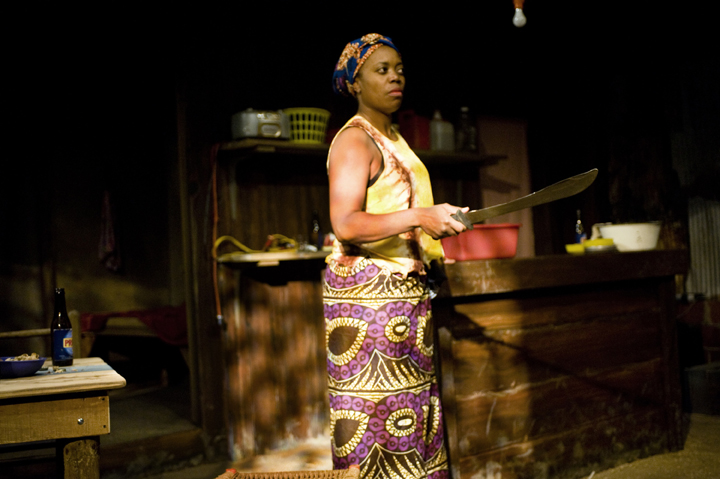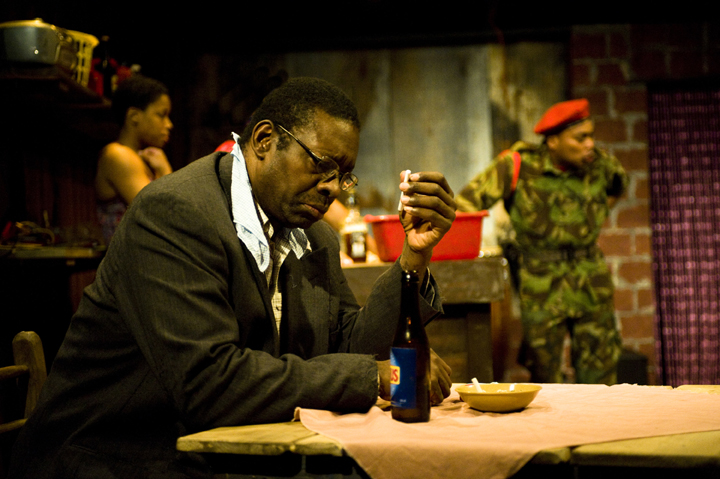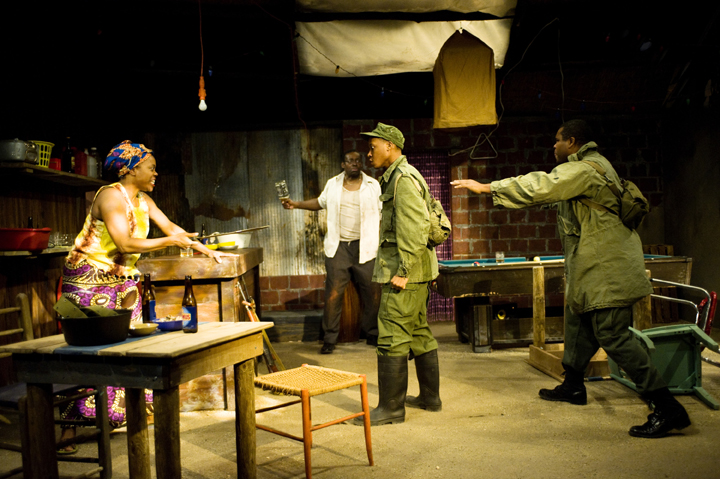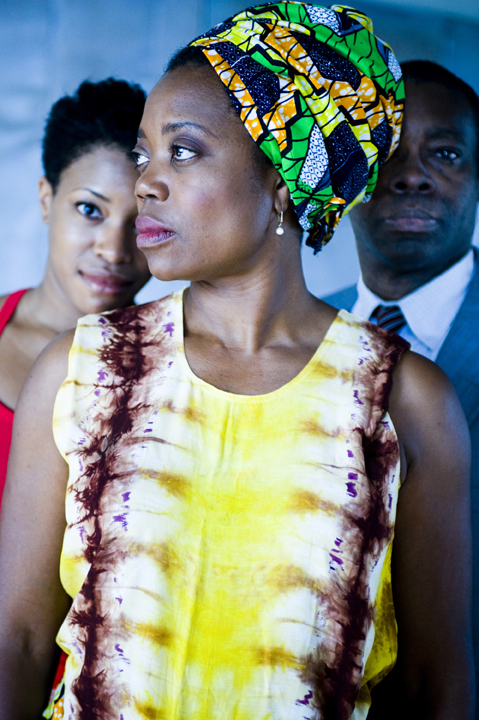The Boundaries of Force and Harm
Theater critic Quinton Skinner weighs in on Mixed Blood's new production, Lynn Nottage's "Ruined", directed by Aditi Kapil. He calls it a "play of startling intelligence and acuity," a powerful story of survival in extremity.






However far-flung our adventures into the ethereal realms of idea and spirit, we never entirely escape the conditions of our physical incarnation: legs, arms, senses, permeability, strength and weakness, sex. This is, after all, where we live, the source of pain and pleasure, fear and transcendence.
Lynn Nottage‘s Ruined is a play of startling intelligence and acuity; at its heart, this is an unflinching story of survival in extremity. The play’s cognitive power lies in its exploration of the boundaries of force and harm, telling a story of the basest motivations–and what possible amelioration can be found by way of response.
The action takes place in the Congolese rainforest, where Mama Nadi (Regina Marie Williams) runs a full-service outpost. With the country wracked by interminable civil war, Mama Nadi’s is an oasis in which miners, soldiers, and traders can procure food, drink, and access to young prostitutes.
Our moral compass spins from the opening scene, with the arrival of Christian (Bruce A. Young), a regular guest from the city who plies Mama Nadi with lipstick in exchange for cold Fanta orange soda (and who, it is increasingly clear, is smitten with her). As the scene unfolds, it becomes apparent that he also has a history of bringing girls to work there; this time, Christian arrives with Salima (Aimee Bryant) and Sophie (Celeste Jones) in tow.
Jones’s Sophie is furtive and painfully shy, which Christian proceeds to inform Mama is the result of the girl being “ruined”: that is, so severely sexually abused as to be permanently disfigured. Salima, who in this scenario endured a lesser trial, was sexually enslaved by soldiers over a period of months and subsequently shunned by her husband and family upon return to her village.
Mama Nadi takes in the girls, reluctantly, and for a time the rhythm of the story falls into that of commerce. Nottage makes a conscious nod to Brecht’s Mother Courage, and Williams is convincing as a self-possessed scrapper with her own, idiosyncratic ethics (not least when Mama Nadi proclaims, “I put food in the mouths of eight women.”). Aditi Kapil‘s direction accommodates well-wrought scenes in which action is taking place all over the stage at once — small vignettes of exploitation and desperate pleasure-seeking.
In time, though, this tenuous peace cannot hold. Mama Nadi’s homely sanctuary, self-consciously forged as a bulwark against chaos and the tides of brutality, succumbs to the forces at work outside its walls. The nation’s civil war encroaches closer and closer, with soldiers from varying factions appearing, one after the other, all sides convinced of their righteousness — and all thoroughly prepared to commit acts of objective evil in order to prevail.
One faction is helmed by a rebel leader called Kisembe (Gavin Lawrence), whose forces stalk, and are stalked, by those of Osembenga (Irungu Mutu). When each takes a break from the war, they appear separately with their cohorts at Mama Nadi’s with attitudes of cocksure aggression and barely stifled violence. Each progressive scene grows more fraught, and Williams, from time to time, lets her character’s façade slip for just a moment; she lets us see how much effort it takes Mama Nadi to balance the demands of each side and to maintain her neutrality.
“The mess is outside,” Mama Nadi announces at one point, though by then her proclamation amounts to wishful thinking. The air is redolent with malice and murder, and even old hands are getting out of Dodge.
Tom Barrett’s scenic design puts the main room of Mama Nadi’s at the forefront, while a cutaway sector depicts the cramped, Spartan private space that the young women share. Katharine Horowitz’s sound work juggles ambient rainfall with bursts of radio noise and stretches of live music (the recalcitrant Sophie becoming the place’s chanteuse), in a sonic palate that enhances the show without imposing distraction.
Distraction, though, is the order of the day as events heighten. Christian takes his first drink in years at virtual gunpoint, and promptly goes into a state of emotional collapse. The cool, icy prostitute Josephine (Ericka Ratcliff) has a compressed breakdown of her own while ostensibly dancing for joy. Salima’s husband, Fortune (Namir Smallwood), makes an ill-timed appearance at Mama Nadi’s, a soldier looking for his wife; when she rejects him, he stands alone in the night, staring into the middle distance, a world of hidden thoughts churning turbulently within.
“The mess is outside,” Mama Nadi announces at one point, though by then her proclamation amounts to wishful thinking. Instead, the air is redolent with malice and murder, and even old hands, such as mineral trader Mr. Harari (Paul Meshejian), are getting out of Dodge. When death does indeed make an appearance, it naturally strikes one of the most vulnerable characters. Although Nottage makes a forgivable misstep in lending Salima a line toward the end that crosses the border from the suggestive to the didactic, the heartbreaking events arrive with an air of inevitability.
And then, this wrenching narrative turns on its heels and becomes, in appropriately understated fashion, a love story of sorts. The waters are too deep here, and so muddied with blood, for there to be anything as pat as redemption for these characters. But Williams and Young, after sparring all night, infuse light into the gloom with a shared moment of transcendence. Mama Nadi, for all her complexity and unapologetic ruthlessness, allows the slightest hint at what lies beneath her stony veneer. It’s a hard-won moment, and it works.
Mixed Blood has crafted a satisfying, harshly elegant work here, discomfiting from the start but constantly engaging. The realm of Ruined feels like the space in which imagination is of no use, where dreams are an unthinkable luxury. The reality is, there are lives stained by such violence, exploitation, and atrocity. Ruined offers no answers for why this is so, but it lends real dignity and insight into the very notion of surviving the unspeakable.
Performance details: Ruined, written by Lynn Nottage and directed by Aditi Kapil, will be at the Mixed Blood Theatre in Minneapolis through November 22. Visit the theater’s website for ticket details, show times, and additional background on the play.